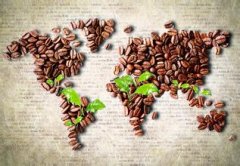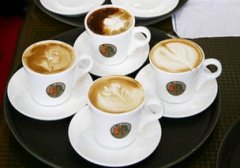The spread and Development History of Coffee in Europe

From the end of the fifteenth century to the beginning of the sixteenth century, coffee was a popular drink in the Middle East, but it was also regarded as a medicine. European ambassadors and merchants in Turkey also believed that coffee was a healthy drink with special curative effects.
The famous German botanist Lohof wrote a book on coffee as early as 1582, but it was the Venetians who first imported coffee beans in 1615.
Venice in 1645 saw the birth of Europe's first open street cafe. Paris and Vienna followed suit, with relaxed romantic French sentiment and Viennese literati temperament each occupying a grid, becoming the forerunner of the two major trends in European cafes in the future.
Before Spain and Portugal built powerful fleets, trade between Europe and the Middle East was entirely mediated by Venetians, so it is no surprise to historians that the first coffee beans in Europe were brought by Venetians.
Coffee was expensive and too extravagant to drink, initially sold mainly to European pharmacists, but gradually became popular in the late 17th century, and peddlers selling lemons or herbs began to sell coffee, which became the most popular drink in Italy.
Although coffee was quickly accepted by Christians, Christian conservatives complained that coffee was a "Satanic drink" and asked the Pope to ban Christians from drinking coffee because Muhammad forbade Muslims to drink Christian wine and Muslims replaced wine with coffee.
It is said that at that time, the Roman Church "Emperor Clement VIII" tried to drink coffee and said,"Wow, Satan's drink is really delicious, if it is not for non-Christians, it is not sad, we might as well give coffee a holy name and make fun of Satan." Let coffee be the drink of Christ."
At the end of the 17th century, many cafes appeared in Venice's San Marco Square, which immediately became a gathering place for ordinary people or royal nobles. The Caffe 'Florian, a famous cafe still operating in the square, was founded in 1720. At that time, there was no postal service. Guests always liked to give letters or items to Caffe' Florian, which was transferred by the owner. This cafe also became an important information center in Venice.
Important Notice :
前街咖啡 FrontStreet Coffee has moved to new addredd:
FrontStreet Coffee Address: 315,Donghua East Road,GuangZhou
Tel:020 38364473
- Prev

Coffee culture Coffee spread track in the world
Coffee was introduced into Europe Islam prohibited drinking alcohol, but also from the side to promote people to drink a lot of coffee, in the 16th century, coffee in the name of Arabic wine attracted the attention of European countries. However, Arab countries are very strict with the export of coffee, and even require raw beans to be boiled before they can be exported. However, with the continuous development and frequency of trade, coffee in Europe in the mid-17th century.
- Next

The spread and Development Culture of Coffee in China
The history of the introduction of coffee into China is not long, and it was not until 1884 that coffee was first planted in Taiwan Province. In the mainland of the motherland, the earliest coffee cultivation began in Yunnan. At the beginning of the 20th century, French missionaries brought the first batch of coffee saplings to Binchuan County, Yunnan Province, and began to grow coffee in the mainland. Chinese people have been drinking tea for thousands of years.
Related
- How did the Salvadoran coffee industry develop in Central America?
- What exactly does the golden cup extraction of coffee mean?
- The Origin of Coffee flower
- [2023 Starbucks World Earth Day] there are more meaningful things besides free Starbucks coffee!
- What kind of coffee is there in Spain? 9 Flavors of Spanish Coffee
- Aromatic African coffee| Kenya's coffee culture and historical production area
- Liberica Coffee Bean knowledge: the characteristics of Liberian Coffee beans of the three original species of Coffee beans
- The origin and formula of Spanish latte introduces the taste characteristics of Bombon coffee in Valencia, Spain.
- How to adjust the solution of over-extracted coffee
- What is the tasting period of coffee beans? What is the period of coffee and beans? How should coffee wake up and raise beans?

